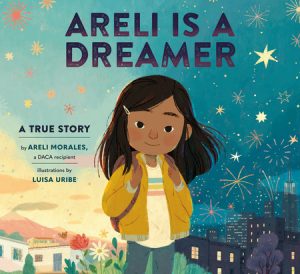 Areli Is a Dreamer
Areli Is a Dreamer
Written by Areli Morales
Illustrated by Luisa Uribe
Random House Studio, 2021, 40 pp
ISBN: 978-1-98489-399-4
Spanish edition, 978-0-59338-008-6 (Areli es una dreamer)
Areli Is a Dreamer is a true story based on the author’s immigration experience as a child and later as a beneficiary of the Deferred Action for Childhood Arrivals (DACA) program, established in 2012 by the U.S. Homeland Security to allow certain individuals who came to the United States as children to request deferred action for several years and be eligible for work authorization.
In a rural town in Mexico, Areli lives with her Abuela and big brother Alex. Every Sunday, they wait anxiously for their parents’ phone calls, who live in the U.S. They remind them of their promise that one day they will all be together. Alex was born in the U.S., while Areli was born in Mexico. They live with their Abuela in Mexico, knowing Alex will travel first to reunite with their parents, who live in New York. One day, Alex travels to the U.S. and Areli continues with her life and starts preschool at the local school near her Abuela’s house. Areli hears she will soon travel to New York to reunite with her family, and a family friend she has never met will take her. Once she relocates, she faces new challenges, such as learning a new language and understanding she is not a citizen, and perhaps will not have the same privileges as her brother. The family also experiences challenges because they are undocumented. Nevertheless, Areli learns that her immigration journey could bring opportunities for success.
Areli Morales’ narrative is so authentic and realistic that it allows readers to understand Areli’s mixed feelings. On the one hand, Areli is sad to leave her Abuela, her school, and her community, saying “I don’t want to go to New York!” At the same time, she is happy and hopeful to join her parents and brother. Areli fears leaving behind her world, everything she knows, capturing a real immigration tension from a child’s perspective when she says, “I want to stay here with you! And my friends. And my home. Please don’t make me go, Abuela.”
Luisa Uribe’s authentic illustrations invite readers into Areli’s story. Her drawings reflect Areli’s environment, such as the hens running around while the cousins play escondite or hide-and-seek at Abuela’s home in Mexico. Uribe skillfully illustrates the emotions of Areli and her family, ranging from excitement while talking on the phone with distant parents or her and Abuela’s inconsolable facial expressions when they need to separate. Uribe’s illustrations capture the essence of the suburb and rich visual details of New York, illustrating the streets and busy walkers around the street. The illustrations allow readers to visualize the setting and character mood, such as the images portraying Areli’s joy when she arrives at her parents’ apartment.
This book is also helpful in talking about issues such as the suffering of children when they are separated from their parents. The immigration process involves the changes and stress that come with moving to another country, worrying about the immigration status of parents, becoming familiar with a different school system, and leaving family and friends behind. While learning a language, emergent bilinguals’ interactions with other children are affected because they cannot fully express themselves and share their knowledge. From a child’s perspective, this is a traumatic experience to which the community must pay attention and requires professional support to promote the socio-emotional stability of children.
Some realities are harsh but are worth discussing so young children understand the difficult experiences of immigrant families. Areli’s story upholds the notion that children can persevere to adapt to a new country and understand family love across borders. With this authentic cultural understanding, children can see themselves reflected in these experiences or relate to what is happening in their community.
One book that can pair with Areli Is a Dreamer is Finding Home: The Journey of Immigrants and Refugees, by Jen Sookfong Lee and Drew Shannon (2021), narrating the immigration journey of Lee’s family that started with her grandfather, who came from China. This book depicts the trajectories of immigrants and their reasons for immigrating or requesting asylum as refugees. Another pairing is Waiting for Papá/Esperando a Papá, by René Colato Laínez and Anthony Accardo (2015), a bilingual book about Beto, a young Salvadorian child who longs for his father as he endures a family separation. Also Dreamers, by Yuyi Morales, (2018), is rich in lyrics and captures the hopes and strengths immigrants bring when they move to the U.S., to make a new home after leaving everything behind.
Areli Morales Romero was born in Puebla, Mexico, and moved to New York City to join her family. She is an early childhood bilingual educator, working as a substitute teacher in New York. Her Twitter is @arelinyc. Areli Is a Dreamer is her first picturebook. Her story is also available in Spanish as Areli es una dreamer.
Luisa Uribe has illustrated more than ten books and was awarded the 2018 Society of Illustrators Dilys Evans Founder’s Award for The Vast Wonder of the World. She lives in Bogota, Colombia. You can find more information about her artistic work at @lupencita on Instagram or Twitter and her website www.luisauribe.com.
Myriam Jimena Guerra, Texas A&M University-San Antonio
© 2022 by Myriam Jimena Guerra

WOW Review, Volume XIV, Issue 4 by Worlds of Words is licensed under a Creative Commons Attribution-NonCommercial-ShareAlike 4.0 International License. Based on work by Myriam Jimena Guerra at https://wowlit.org/on-line-publications/review/xiv-4/4
WOW review: reading across cultures
ISSN 2577-0527
